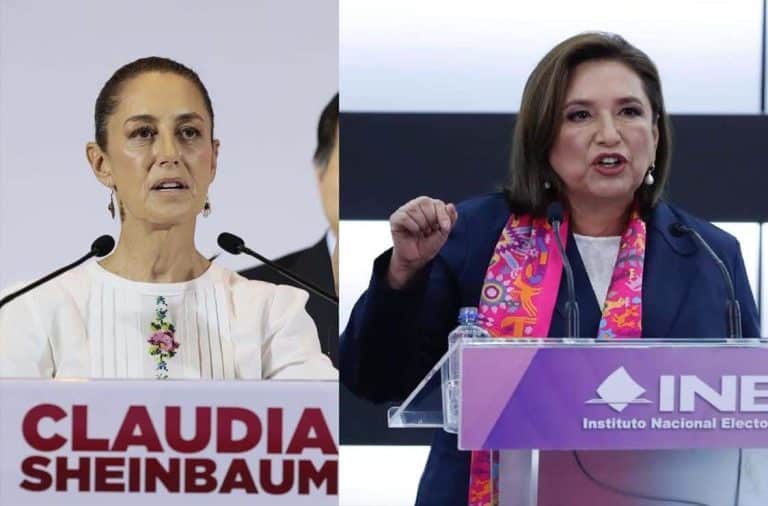17 de marzo 2024

Children of Exile: The Births “Sowing Hope” in the Camp of Nicaraguan Farmers

PUBLICIDAD 1M
PUBLICIDAD 4D
PUBLICIDAD 5D
The president, whoever she may be, should exert checks and balances against old and new regional authoritarianisms, all led by men

The governing party candidate Claudia Sheinbaum (left) and opposition candidate Xochitl Galvez. Photos: EFE
Throughout the six-year term of Andres Manuel Lopez Obrador, there has been much debate about the daily polarization of public life, incentivized by the government, its opposition, but above all, by the president of Mexico himself from his privileged morning space. If that polarization, which is social, political, and ideological, can be harmful to democratic functioning, the current electoral polarization, at the end of the six-year term, is not only inevitable but necessary.
Partisanship invades public opinion, on the eve of the June 2nd electoral contest. For Mexico, this is a virtual bipartisanship, very different from its recent political tradition. In the last five federal elections, from 1994 onwards, three options with considerable demographic support have participated: a winner, an intermediate, and a third place with relative weight.
To get an idea of this tripartite scheme, one only needs to remember that the third place, in 1994, with Cuauhtémoc Cárdenas and the PRD, won almost 6 million votes. In 2000, again Cárdenas and the PRD reached more than six million two hundred thousand votes. Between 2006 and 2018, that third position obtained more than 9 million with Roberto Madrazo and the PRI in 2006, more than 12 with Josefina Vázquez Mota and the PAN in 2012, and again, more than 9 million with José Antonio Meade and the PRI in 2018.
Most polls give Claudia Sheinbaum a solid advantage over Xóchitl Gálvez, but they also record a faster growth of the second candidate’s campaign. If the electoral scenario is a close race between these two alternatives, electoral polarization could translate into de facto bipartisanship, although each option does not correspond to a party but to an alliance or coalition of parties.
One of the advantages of this scenario, whoever wins, would be that the winner will not hold an overwhelming hegemony. The aspiration for a total victory, so evident in the most triumphalist sectors of Morena, would dissipate in a close final between Claudia and Xóchitl, since despite the recurrence of split voting, the good performance of each candidate will favor their alliance at the legislative level.
Another advantage of a close competition between the two candidates is that it would produce the first female succession in the history of Mexico. Since the time of Porfirio Díaz, the presidential succession has been one of the great dilemmas of the Mexican political system. Until the year 2000, that succession always occurred without alternation, in various authoritarian contexts. Now it will occur in favor of a woman.
The immediacy of the electoral struggle prevents seeing the importance of this phenomenon in the long duration of Mexico’s history. An importance that extends also to the Latin American context, where Mexico exercises a natural leadership that is not always well capitalized. The president, whoever she may be, should exert checks and balances against old and new regional authoritarianisms, all led by men.
This article was published in Spanish in Confidencial and translated by Havana Times. To get the most relevant news from our English coverage delivered straight to your inbox, subscribe to The Dispatch.
PUBLICIDAD 3M
Historiador y ensayista cubano, residente en México. Es licenciado en Filosofía y doctor en Historia. Profesor e investigador del Centro de Investigación y Docencia Económicas (CIDE) de la Ciudad de México y profesor visitante en las universidades de Princeton, Yale, Columbia y Austin. Es autor de más de veinte libros sobre América Latina, México y Cuba.
PUBLICIDAD 3D